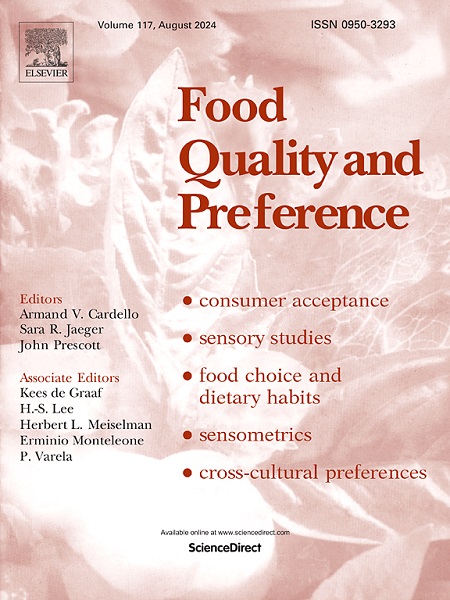有些甜味剂比其他甜味剂更美味?!研究了解甜味剂类型对消费者对柠檬水评价的影响
IF 4.9
1区 农林科学
Q1 FOOD SCIENCE & TECHNOLOGY
引用次数: 0
摘要
与产品成分有关的线索会影响消费者对食品的看法。例如,有关所使用的甜味剂类型的信息可能会影响人们对健康、卡路里含量和预期味道的看法。本研究以这一主题为基础,考察了消费者对甜味剂成分的认识对他们对柠檬水的评价的影响。参与者(n = 101)品尝了五种柠檬水样品(用15%的纯柠檬汁调制),每种柠檬水都加入了不同的成分:糖、蜂蜜、龙舌兰、甜菊糖或糖精。这些样品要么有标签(例如,“蜂蜜柠檬水”,实验条件),要么没有标签(例如,“柠檬水E2W”,控制条件)。我们没有发现标签条件之间的显著差异。然而,甜味剂的类型对评分有显著的主要影响,包括对味道相关(美味、甜度、酸味)、健康相关(健康、自然、卡路里)和享乐/接受(喜欢、未来摄入的意图、支付意愿)变量的评估。分析个体差异和柠檬水评价之间的相关性,可以进一步了解样本是如何被感知的。具体地说,我们发现年龄和喜欢加蔗糖、甜菊糖和糖精的柠檬水之间存在负相关。一般来说,喜欢柠檬水的人更喜欢蔗糖和龙舌兰,而喜欢更甜的饮料的人更喜欢含糖精的柠檬水。讨论了研究结果对工业和公众健康的影响。本文章由计算机程序翻译,如有差异,请以英文原文为准。
Some sweeteners are tastier than others?! Examining the impact of knowing the type of sweetener on consumers' evaluation of lemonade
Cues related to a product's composition can influence consumer perceptions of food items. For example, information about the type of sweetener used may affect perceptions of healthfulness, caloric content, and expected taste. This study builds on this topic by examining the effect of consumer awareness of sweetener ingredients on their evaluation of lemonade. Participants (n = 101) tasted five samples of lemonade (prepared with 15 % pure lemon juice), each sweetened with a different ingredient: sugar, honey, agave, stevia, or saccharine. The samples were either labeled (e.g., “lemonade with honey”, experimental condition) or unlabeled (e.g., “lemonade E2W”, control condition). We did not find significant differences between the labeling conditions. However, the type of sweetener had a significant main effect across ratings, including evaluation of taste-related (tastiness, sweetness, sourness), health-related (healthfulness, naturalness, calories), and hedonic/acceptance (liking, intentions of future intake, willingness-to-pay) variables. The analysis of correlations between individual differences and lemonade evaluation provides further insights into how the samples were perceived. Specifically, we found a negative association between age and liking of lemonade with sucrose, stevia, and saccharine. Liking lemonades (in general) was positively associated with a preference for the sucrose and agave samples, whereas the preference for sweeter drinks was associated with a higher preference for the lemonade with saccharine. The findings are discussed regarding the implications for the industry and public health.
求助全文
通过发布文献求助,成功后即可免费获取论文全文。
去求助
来源期刊

Food Quality and Preference
工程技术-食品科技
CiteScore
10.40
自引率
15.10%
发文量
263
审稿时长
38 days
期刊介绍:
Food Quality and Preference is a journal devoted to sensory, consumer and behavioural research in food and non-food products. It publishes original research, critical reviews, and short communications in sensory and consumer science, and sensometrics. In addition, the journal publishes special invited issues on important timely topics and from relevant conferences. These are aimed at bridging the gap between research and application, bringing together authors and readers in consumer and market research, sensory science, sensometrics and sensory evaluation, nutrition and food choice, as well as food research, product development and sensory quality assurance. Submissions to Food Quality and Preference are limited to papers that include some form of human measurement; papers that are limited to physical/chemical measures or the routine application of sensory, consumer or econometric analysis will not be considered unless they specifically make a novel scientific contribution in line with the journal''s coverage as outlined below.
 求助内容:
求助内容: 应助结果提醒方式:
应助结果提醒方式:


